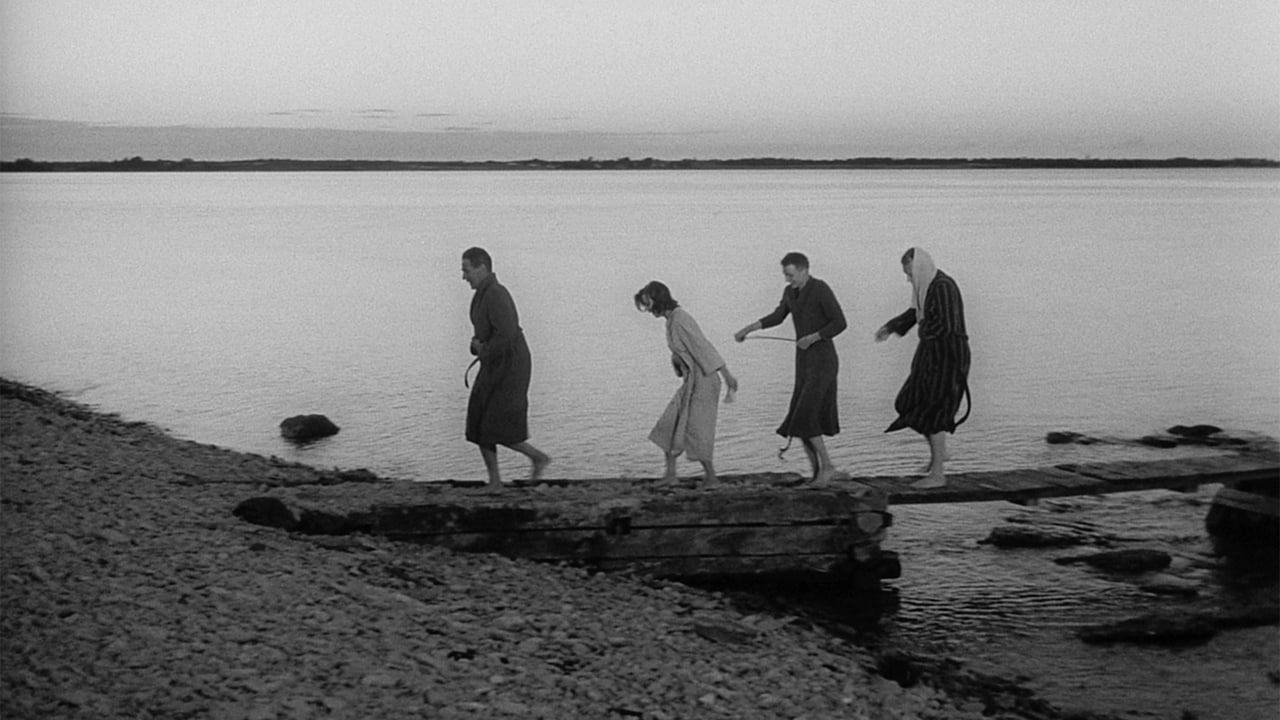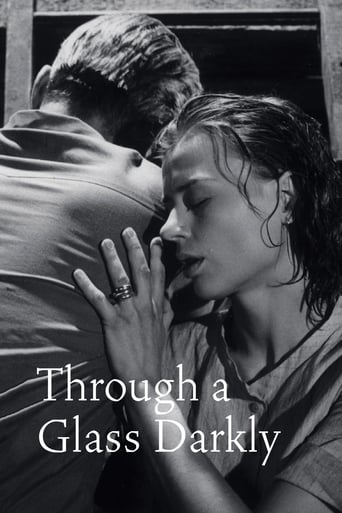

In this haunting film, a mentally ill young woman and three of her family members - younger brother, older husband, and aging father - vacation on an idyllic island. While at first her schizophrenia seems to be in remission, family pressures trigger a rapid decline. To the grief of the rest of the family, her future prospects are dim and she, as the person they knew, may be leaving their lives forever. In the end, we are only left with a small glimmer of hope, that even though life seems cruel and unfair, the ability of people to care about each other provides an intimation that somehow things are not hopeless.Rather than a realistic picture of clinical schizophrenia, the film primarily uses her condition to explore how people struggle with the contrast between the "magic circle" of living an outwardly normal, successful life, with the realities and forces operating apparently from the outside that threaten to destroy their tranquility. The illness of the sister represents one possibility in a life where existentially people find themselves continually in deep water, where their constructs of life are constantly threatened. Each of the family members seems poised between their social construct as a happy, nice family member, and their interior and exterior threats.The father is an aging isolated man who poses as a serious writer tackling serious questions such as the existence of God, but who is suicidally depressed by the knowledge that his writing is pop fluff of no real significance, and that his real preoccupation is not universal issues but his personal failure as father and a husband. The son is young and naive, still living the regulated life of a student, but deeply frustrated in his desires for intimacy with women and recognition from his father. Karin, the daughter, is doll-like and cheerful on the surface, but haunted by the depressing undersurface of life, which is expressed by trenchant observations at first but then increasingly by nightmare hallucinations of wolves, owls, spiders, and voices in her head. She is sexually repelled by and emotionally distant from her older husband and prefers the company of her impressionable younger brother.Max von Sydow, playing the husband, is the most sympathetic and normal member of the quartet, as the supportive husband. He is a stolid, kind, somewhat pompous physician who stays easily on keel with positive and normal thoughts and actions, unlike Karin and the rest of her hyper-sensitive family. However, it is implied that this feat is accomplished through lack of imagination and stubborn refusal to notice whatever isn't "fit to be noticed". The harder he tries to pull Karin back from her visionary fantasies, the more she is repulsed by what she sees as his stupidity.Marring the film are some heavy-handed and overly theatrical moments. For example, where the father, played by Gunnar Bjornstrand, pontificates heavily to the point where suspension of disbelief is stretched, or where the Bach soundtrack comes in to underscore somewhat tediously that a moment is "profound". Related to this, the father plays a self-loathing artist who it is not hard to see as Bergman engaging in self-critique that is overly egocentric, not of general interest.Flaws aside, this is a beautiful movie, that manages to make the most miserable family vacation ever a fascinating experience.
... View MoreKarin, who has till lately been in a mental institution, her husband, who was her therapist, her brother, who has his own problems, and her father, a novelist, meet in an island after a long time, and tensions break out."Through a Glass Darkly" is a very interesting film, where Bergman continues his work about religion and family. Karin is a mentally ill person, but is not the only one with problems, and in some respect is the most free of all, as she, in some respect, tries to break free from her ties. Her husband is actually her doctor, and treats her as if she was a baby. Her brother is still trying to cope with his just awoken sexuality, and her father is a self-centered person, detached, and who can't help but see his daughter's illness as a chance to observe a person on a path of self-destruction.Bergman plays again with death, God and love, how humans can destroy each other, and how our acts can have horrible consequences. All the actors do a great job, but the story is burdened a little bit by the atmosphere and the style of direction, which makes it feel as a play. All the acting, scenery and shots make it very similar to the experience of watching a play, and in some respect, remember the viewer that they are watching a work of fiction.
... View More. . . as THROUGH A GLASS DARKLY may be the closest thing a fan can get to spending a day with the notoriously film-shy J.D.'s surrogate Glass Family. Seventeen-year-old younger sibling Minus has written 12 plays and an opera so far this summer. Minus' counterpart, Plus (for all the voices in her head), a.k.a. older sister Karin, is home on her final furlough from the Nuthouse. For a few hours, Karin's novelist dad David, literature prof Hubbie Martin, and brother Minus manage to pooh-pooh Karin's increasingly psychotic symptoms. But soon, like "Blanche" in Tennessee Williams' STREETCAR, the family needs to entrust Karin to the "kindness of strangers" (if astronomically expensive mental health professionals can be classified as "kind"). On the family fishing boat a bit earlier, David asks Martin if he's ever wished that Karin were dead. (David feels guilty for selecting to reproduce with Karin's long-gone, insane mom, resulting in at least one doomed kid.) Martin replies something like "Heck no!" However, that's before Karin discovers that her long-awaited "God" is a stony-faced spider who tries to rape her. (With dads and deities like that, who needs Bill Cosby?)
... View MoreMany of the films of director Ingmar Bergman (The Seventh Seal, Wild Strawberries, Persona, Cries and Whispers, Fanny and Alexander) appear in the book 1001 Movies You Must See Before You Die, and this Swedish film was another one I had heard the title of a few times. Basically on a small remote island for a vacation, schizophrenic Karin (BAFTA nominated Harriet Andersson) has recently been released from an asylum, her husband Martin (Max Von Sydow) believes that her condition is almost incurable, her brother Minus (Lars Passgård) feels neglected by his father because of his work getting more attention, and her novelist father David (Gunnar Björnstrand) is suffering "writer's block" and he is upset on any attack on his character. At night Karin refuses any erotic approach by Martin, with her psychological problems she thinks she hears strange noises and faints listening to weird voices, her father at night allows her to sleep in his room, but when David leaves the room with Minus she looks through her father's diary that her disease is incurable, and it seems he is callously hungry for all her deterioration details, perhaps to use for inspiration for a new novel. David and Martin go fishing the following morning and have a real conversation about Karin, the husband accuses the father being more interested in his art than his daughter, and the father agrees with most of his comments, he admits also that he attempted suicide by driving over a cliff, but he found loving his daughter, Minus and his son-in-law was what could keep him going and give him hope. Karin meanwhile opens up to Minus about the voices she believes she is hearing, sure that is God that will appear, he meanwhile is sexually frustrated and it is implied that she teases him, and perhaps while on the beach running into a shipwreck even sexually seduces her own brother, she later confesses these actions to her husband and father, she says that the voices told her to do them. A helicopter that will take Karin to the hospital is on it's way, because she has struggled long enough to remain in one of the two realities she has, she disappears in panic for a little while, but returns sedated, and she points out a spider that she claims is God visiting, Karin and Martin leave on the helicopter together, and Minus and David finally find the ability to bond as father and son, discussing the concept of love, their first real conversation. The performance of Anderssen does give an extraordinary performance as the woman slowly descending into madness, the supporting actors are very good too, including the always great Von Sydow, as they spend the time filled with curiosity and helplessness, the story is simple enough to follow, and really cemented the reputation for Bergman making films full of perhaps more doom and gloom than hope, but as with many of his films this is very gripping, an interesting drama. It won the Oscar for Best Foreign Language Film, and it was nominated for Best Writing, Story and Screenplay - Written Directly for the Screen for Ingmar Bergman, and it was nominated the BAFTA for Best Film from any Source. Very good!
... View More